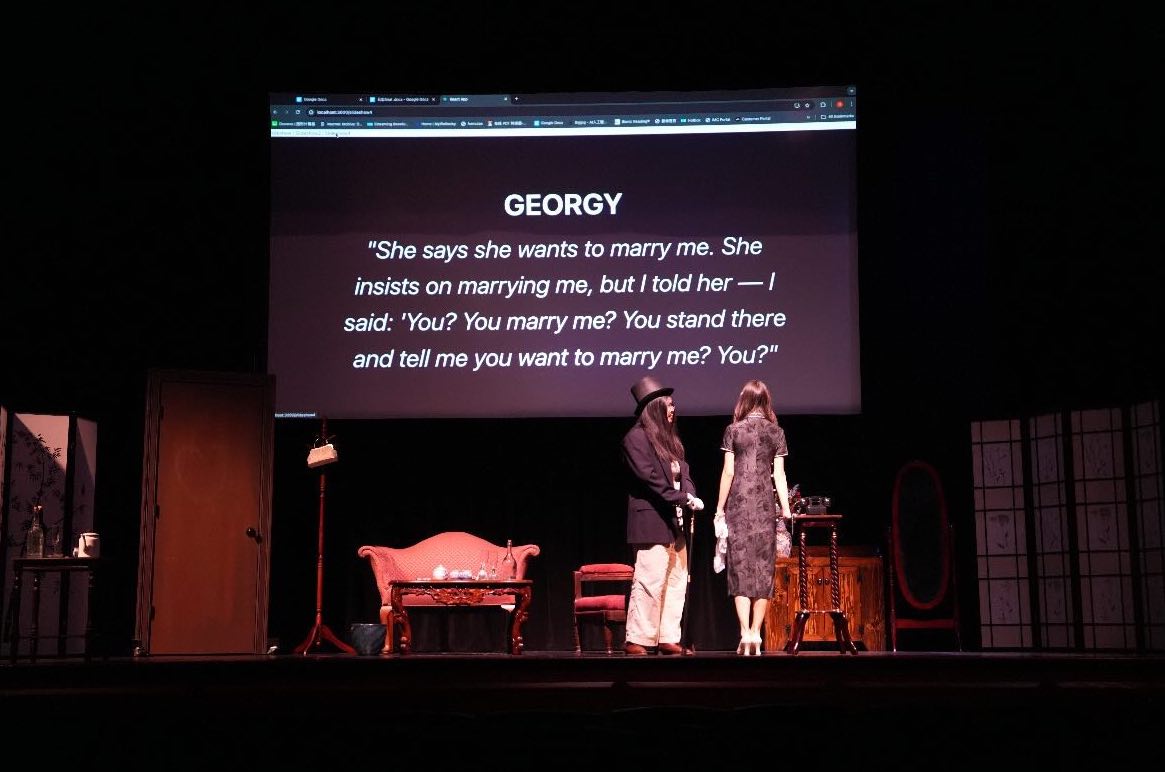By MARIANA ZEPEDA ’14
Staff Writer
In his final lines, Othello asks the Venetians, “When you shall these unlucky deeds relate / Speak of me as I am. Nothing extenuate / Nor set down aught in malice.” Few are strangers to the plot of “Othello,” in which, driven by jealousy, Othello murders Desdemona, his wife. The play reaches a tragic conclusion when Othello realizes that the words of Iago, his most trusted advisor, were maliciously intended to fan the flames of his jealousy. But before he takes his own life, Othello asks to be remembered as “one that loved not wisely, but too well…one not easily jealous, but being wrought / Perplexed in the extreme.” In that moment in the play, I cannot help but wonder whether or not Othello’s jealous fury can be summed up as simply not loving “wisely” enough. As I watched the Actors from the London Stage (AFTLS) perform, this question was on my mind—and I wonder if the production prodded the audience to interpret Othello’s actions more gently.
The AFTLS, a theater group from England currently touring the United States, brings Shakespeare’s plays to university stages throughout the country. This is their eighth visit to Wellesley; past productions have included “A Midsummer Night’s Dream” and “The Merchant of Venice.”
“Othello” was my favorite production of theirs. The group performs under dim lighting, on a bare set and wearing austere costumes—and the roles are divided among a small group of actors. As a fan of more traditional interpretations, I’m always wary of the effects of these choices. But although in other productions I’ve found the actors’ switching back and forth distracting, it seemed to work in “Othello.” The characters remained distinguishable, and therefore these switches did not dilute the plotline, but rather injected humor into one of Shakespeare’s dark plays.
I was especially struck by the extent to which Iago, played by Richard Neale, acted as the natural narrator of the play’s events. The crew played with the lights as Iago took the stage and his monologues commanded silence from the audience. After he convinced Cassio to appeal to Desdemona to repair his reputation in the army, Iago even descended from the stage and walked around the audience, projecting his voice through the auditorium and addressing an audience member directly. Neale’s Iago was controlled and imposing, and he made his case to the audience, gradually getting into everyone’s head.
In his conversations with Othello, Iago did not miss a beat. He was never subservient, even when he pledged allegiance to the warrior. As he preyed on Othello’s insecurities, he retained a sinister element; after dropping hints of Desdemona’s infidelity to Othello, he walked away, leaving the warrior to his destructive thoughts. But, for a second, he turned his face back to Othello’s contorted figure with an eerie look of victory.
Othello’s own inner conflict almost paled in comparison to Iago’s dealings, particularly since his emotionality bordered on ridiculous. His vulnerabilities stayed at surface level, etched out in his face and posture—Jude Akuwudike used his body as a canvas to showcase the character’s emotional distress even when his face wasn’t visible. But his exaggerated emotionality diluted the tragic nature of the character’s slow descent into the madness of jealousy. It was Othello’s shifts from unbounded anger to self-pitying restraint during his final conversations with Desdemona that fully captured the character’s pain.
Alinka Wright’s Desdemona was light and breezy; her interpretation telegraphed the character’s innocence and good nature. Her reactions to Othello’s transformations were aptly played. (“My lord is not my lord,” she says faintly to Emilia in a heartbreaking scene after Othello’s behavior first shifts.)When Othello first struck Desdemona, a collective gasp issued from the audience. Afterwards, Wright stood directly under the stage lights, her sorrow etched on her face.
But despite the play’s tragic overtones, this production was not lacking in comic relief. In early scenes, for instance, Othello and Desdemona acted like lovestruck teenagers (with serious PDA—one audience member even yelled out “Ew!” in the middle of one of their numerous make-out sessions). Playing the relationship between these two characters in a humorous way lent an aura of innocence to their love and elicited strong responses from the audience. But this interpretation bordered on farcical. It became harder and harder to take Othello seriously as he made eyes at Desdemona and embraced just her a little bit too passionately.
Unsurprisingly, however, Roderigo was the king of comic relief. This character certainly fell deep into farce, but this is his natural state. Jan Shepherd played up his idiocy and eagerness for encouragement with hilarity as he fell prey to Iago’s words. Roderigo quickly became an audience favorite; people started anticipating his arrivals to the stage, tittering at the mere mention of his name.
Though a more peripheral character, Cassio brought humor to the production as well; Jack Whitam was great as a vacuous Shakespearean playboy.
I’m not sure why the austere setting lent itself to “Othello” more than to other AFTLS interpretations; perhaps the inevitably comedic aura that it brought balanced out the play’s tragic plot. In a comedy like “A Midsummer Night’s Dream,” character switches brought the play to its knees as the characters blended together in a haze of way too much energy. But in a tragedy like “Othello,” these ridiculous moments translated into comic relief.
The AFTLS also taught workshops for classes in the English and Theatre Studies departments. Their performances were free and open to the public.






